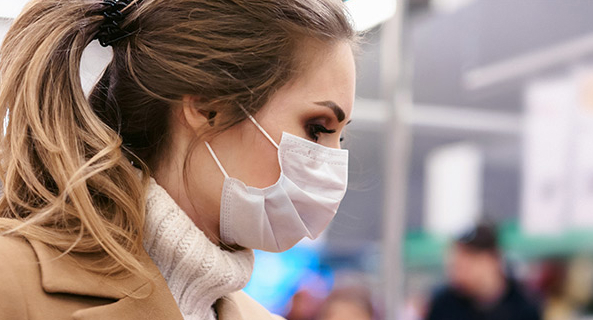How do I prevent Mask Acne?
Face masks are great for protecting yourself against the transmission of viruses like COVID-19. But they can leave your skin a little worse for wear with a few unwanted side effects, like face mask acne. So if you’re looking to prevent mask acne or treat your spots, we’ve put together a few tips to avoid and alleviate the symptoms.
What is mask acne?
Mask acne, also known as maskne, is essentially a breakout that’s caused by wearing a face mask for extended periods of time. Because of this, it’s usually limited to the area of your face that’s covered by the mask.
Maskne isn’t just restricted to pimples, blackheads and breakouts. Mask acne can also exacerbate other skin conditions like rosacea, dermatitis or folliculitis. If you’re already prone to these skin ailments, then wearing a mask can cause these conditions to flare up.
What causes mask acne?
Mask acne is caused by a combination of humidity, debris on the surface of your skin and friction.
You might have noticed when wearing a mask that it can get a bit hot and sticky from your breath and sweat. When a mask sits against the skin for an extended period, the humid environment is the perfect breeding ground for bacteria.
Coupled with debris like oil, dead skin cells and sweat which naturally build up on the surface of your skin throughout the day, can cause more frequent breakouts. Friction from the mask constantly rubbing against your skin can also cause redness, irritation and chafing.

How to prevent maskne
Prevention is key when it comes to face mask acne, these are a few things you can do to prevent breakouts from happening:
1. Replace disposable face masks regularly. The Department of Health recommends disposing of face masks every four hours or when it becomes soiled, damp or damaged. Ensure that you wash your hands for a minimum of 20 seconds when changing masks
2. Take a mask break. If possible, it’s worth giving your skin a few minutes to breathe. Try taking a 15-minute break from your mask every four hours, ensuring that you’re in a safe environment to do so.
3. World Health Organisation advises you should wash cloth masks daily at a minimum o r whenever it gets dirty.
4. Hydrate your skin before wearing a mask with a moisturiser that’s formulated for your skin type.
5. Avoid wearing makeup as it can increase the chance of clogged pores and breakouts.
6. Wash your face daily using a gentle cleanser. Then repeat that again once you’ve taken off your mask for the day to remove any oil and debris.
7. Fit your mask correctly. It should sit snugly against your face with the nose wire firmly moulded to your face.

Quick tips for treating mask acne
If you do happen to find yourself with maskne you can usually treat it the same way you would a normal breakout:
1. Cleanse your skin. Use a gentle cleanser that contains an active ingredient that’s formulated to unclog your pores and remove debris from your skin.
2. Use a spot treatment. Spot treatments, formulated to minimise pimples and breakouts.
3. Moisturise your skin. Get to know your skin type so you can pick a moisturiser that works for you. There are plenty of moisturisers out there that cater for oily, dry, sensitive and combination skin types.
If the symptoms persist, talk to your doctor or a qualified healthcare professional to discuss different treatment options.
Detmold Medical is home to a huge range of disposable face masks that have been designed in collaboration with healthcare and industry experts to ensure breathability and comfort for the wearer. Explore our collection of D95 respirators, surgical masks, medical procedure masks and community masks.




